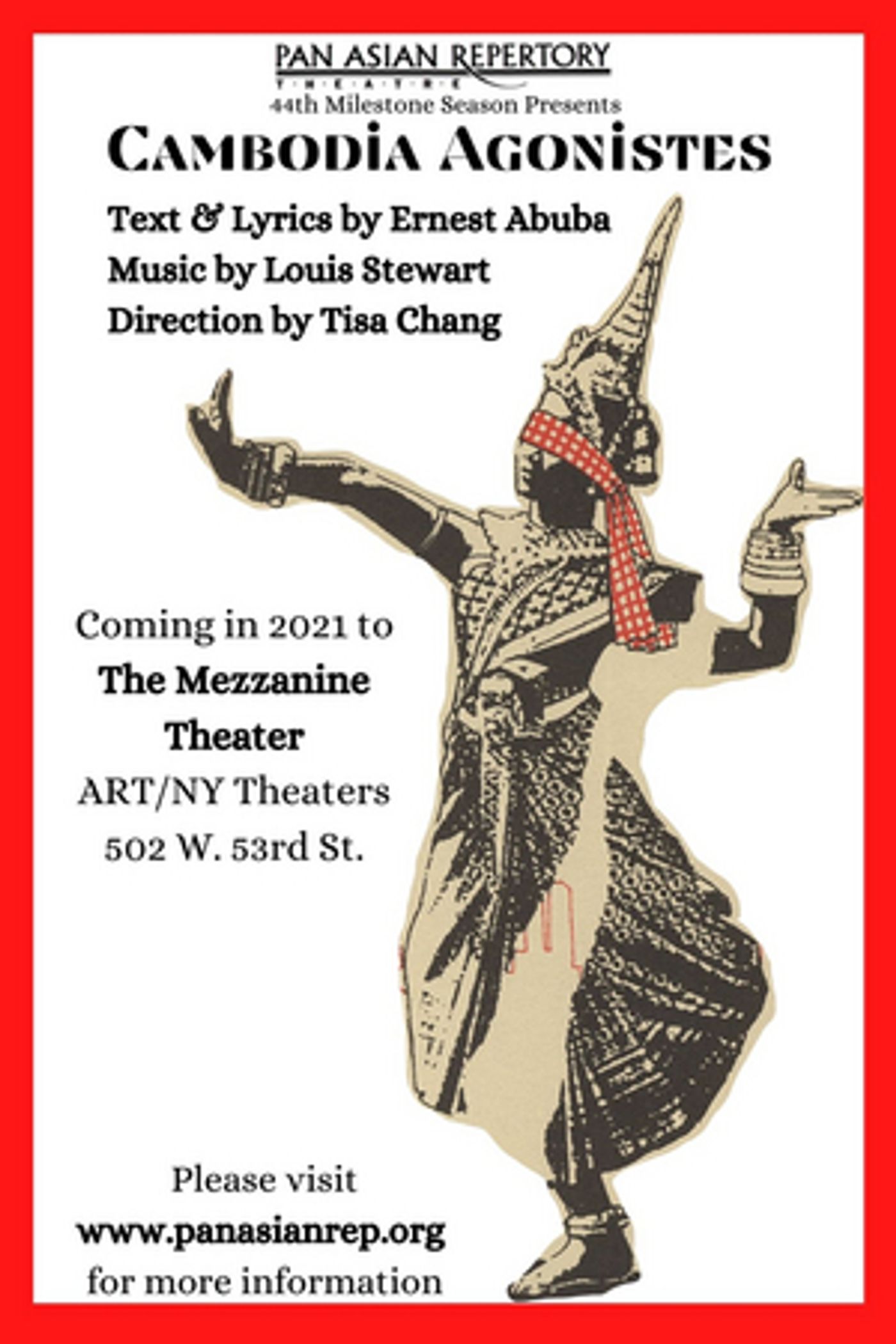Pan Asian Repertory Theatre Announces Cast for CAMBODIA AGONISTES
The cast will feature Sean Jones, Saki Masuda, Alexandra Palting, Chrissy Pardo, Tony Romero, Hyunmin Rhee, and Paulina Yeung.

Pan Asian Repertory Theatre, supported by a prestigious $35,000 Award from the National Endowment for the Arts, in preparing for the return to live theater in 2021, has announced the cast for the re-envisioned revival production of the musical Cambodia Agonistes, from darkness into light, with text and lyrics by Ernest Abuba, original music by Louis Stewart.
Under the direction and with musical staging by Pan Asian Repertory Theatre's Founding Artistic Director Tisa Chang, the seven-member cast will feature Sean Jones, Saki Masuda, Alexandra Palting, Chrissy Pardo, Tony Romero, Hyunmin Rhee, and Paulina Yeung as The Dancer. Performances will take place in The Mezzanine Theatre at A.R.T./NY Theatres (502 West 53rd Street). Pan Asian Repertory Theatre plans to pave the way for the return of live theater with a rescheduled premiere in 2021. Official performance dates will be announced shortly.
Cambodia Agonistes, from darkness into light, is a timely, compelling work, reminding us of resilience and recovery from genocide and urging us to learn from history. It is an epic music-theatre piece celebrating the resilience of the Cambodian people featuring a soaring score, with full orchestral accompaniment, that includes musical numbers ranging from operatic lyricism to beat café jazz. Its story is given renewed significance of recovery and resilience in the wake of recent refugee crises and civil wars. It tells the story through the lens of a traditional Cambodian dancer, suffering from psychosomatic blindness, who seeks refuge in New York.
"Cambodia Agonistes depicts an authoritarian regime," expressed playwright and lyricist Ernest Abuba. "It has been estimated that the Khmer Rouge exterminated 1-2 million people between the 1975-1979." He added, "In 1979, I saw a newspaper photo of a think young woman, facing the camera, as she walked down a dusty Southeast Asian road and in her arms she cradled the body of a dead child. That photograph seemed to encompass not only the full horror of the Cambodian Holocaust, commonly known as "The Year Zero," but also to symbolize the resilience of individuals, especially women, to survive. The memory and that image of the woman would never escape me." He went on to add, "I began to read about the women refugees from Southeast Asia, living in California, who became "blind" with no clinical basis." In speaking about his play he added, "My character Pran My Huoy, called The Dancer, began to materialize. The other central character, The Child Who Becomes a Dictator, reflects my Buddhist belief that the Karma of one's evil reincarnates just as good does." He concluded with, "It is a moral imperative to recognize that global democracy at present is actively being threatened. For me to re-examine my play in light of this darkness is a necessity."
Composer Louis Stewart shared, "In 1990 I was asked to compose music for Ernest Abuba's play Cambodia Agonistes. Because of the seriousness of the subject, as well as the setting in Southeast Asia, I elected to use a variety of musical styles to fit the subject's drama to express the cultural milieu and themes of loss and vengeance." He went on to say, "Stylistically, the choice of Southeast Asian music was pivotal because of the Cambodian setting. The opening number, "Remembering When," is an example of using a gamelan style of music to reflect a tranquil Cambodia, and "The Splendors of Old Cambodia" evokes a traditional Royal Court dance where I uses bell-like gamelan sounds to convey a sense of classical serenity. In contrast, another choice was the inclusion of a Broadway jazzy style in parts of the drama - "Wisdom is a Sin Against the State" - with irony and black humor." In closing he stated, "Finally, this musical, which borders on opera, must have songs that contain lyricism, romantic in essence."
Director Tisa Chang stated, "As director for this epic story akin to Greek tragedy (borrowing 'Agonistes' from Milton's poem), I elected to counterpoint the drama with the use of Cambodian and Southeast Asian traditions of religion, design, movement - adding a 'dream ballet' inspired by a classic Cambodian Royal Court dance reflecting The Dancer's early student years. The songs which encompass inventive jazz syncopation and minimalist reveries, to soaring operatic grandeur, gave me inspiration and latitude for imagistic staging." She went on to add, "Now, with the support of a full orchestral arrangement recorded by the Royal Scottish National Orchestra, our 2021 production will elevate the story telling and heighten dramatic events with timeless universal relevance to resonate with a broader audience."
Chang concluded with, "I feel fortified to be able to introduce Cambodia Agonistes for the next generation of artistic performers and audiences. One of the most memorable experience in our tour to South Africa, representing the United States at the 1995 ARTS Alive Festival in Johannesburg was performing at The Market Theatre just after Nelson Mandela became President. While apartheid was technically abolished, we played a matinee to Afrikaners who were polite but distant, and in the evening to various Africans, many uprooted from neighbor countries, to a rousing reception as they could relate to the themes of civil war and displacement."
The creative team includes Set by You-Shin Chen, Lights by Leslie Smith, and Costumes by Karen Boyer. Dream Ballet Choreography by Rumi Oyama. Music Supervision by Yan Li. The Stage Management team is Kristine Schlachter and Sabrina Morabito.

Videos


